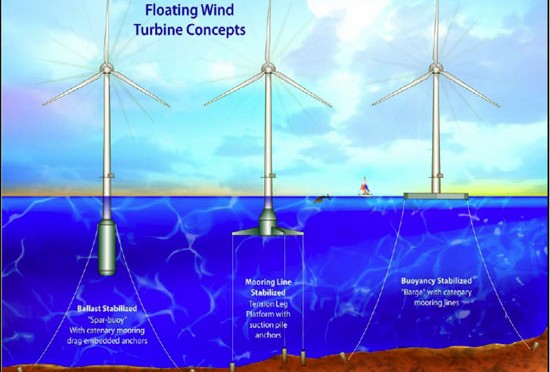The UK’s first floating wind farm is set to be located off the Scottish coast after The Crown Estate granted a lease to Statoil for the next phase of its Hywind project.
The project comprises five, 6MW floating turbines operating in waters exceeding 100m in depth at a site in Buchan Deep, approximately 20-30km off the coast of Peterhead, Aberdeenshire. At a total capacity of 30MW, the scheme is set to be the largest floating wind project announced to date in Europe and one of the largest announced worldwide.
The Buchan Deep floating wind farm builds on the success of the first phase of Hywind; the successful demonstration of the world’s first full-scale floating turbine, in operation since 2009 off the coast of Norway.
The Crown Estate and Statoil have been working together closely over the past two years to progress this project, which will further enhance the UK’s position as a global leader in offshore wind technology development. Statoil are now working to secure the necessary consents from Scottish Government.
The UK has one of the best offshore wind resources in the world. Floating technology can play an important part in realising this potential, allowing developers to access new sites in deeper water, where installing conventional offshore wind turbines is not viable, and helping to substantially lower the cost of energy generated from offshore wind.
The site at Buchan Deep will also play an important role in demonstrating that the technology can operate as part of an array as well as showing how knowledge, gleaned from Hywind’s first stage, has been incorporated into the latest designs.
Statoil’s senior vice president for Renewable Energy, Siri Espedal Kindem, said: “This is a significant milestone for the Hywind Scotland Pilot Park. It represents a new step in the development towards a future floating commercial scale park. We look forward to a progressed dialogue with key stakeholders in Scotland including communities, the local supply chain and the authorities.
“We will continue to mature the Hywind Scotland Pilot Park towards a final investment decision, by conducting marine surveys and concept studies in order to demonstrate technical and commercial feasibility for future offshore floating wind.”
Head of Offshore Wind at The Crown Estate, Huub den Rooijen, said: “Investing in new technologies will be crucial to unlocking offshore wind potential over the long term whilst we continue to focus on the current development pipeline.”
Energy Minister Michael Fallon added: “This innovative project will lead to the construction of the first floating offshore wind farms in the UK. This underlines the dynamism of the sector, and the UK’s attractiveness as the number one destination for offshore wind development.”
The Crown Estate manages almost the entire UK seabed as well as renewable energy generation rights on the UK continental shelf. It plays an active role in supporting growth in the offshore renewable energy industry, leasing seabed for commercial schemes as well as for test and demonstration projects.
As well as today’s announcement, The Crown Estate is also running a test and demonstration programme which includes a leasing round for offshore floating wind projects, designed to highlight the commercial viability of the technology and the benefits it can bring beyond 2020.
WWF Scotland director Lang Banks said: “This is a landmark announcement that could help firmly establish Scotland at the forefront of global moves to generate clean energy from offshore wind.
“Scotland has an estimated quarter of Europe’s total offshore wind resource. However, to be fully able to tap into that potential we need to continue to develop ways to operate offshore, especially in deeper waters, and this project will help to do that.
“Successfully developing floating turbines could enable the UK to secure even more clean energy from offshore wind and help reduce some of the potential impacts associated with traditional seabed-based turbines.
“Alongside energy-saving measures, offshore wind and other renewables have a critical role to play in helping Scotland reduce climate emissions, create jobs and generate export opportunities.
“With careful planning we can harness offshore wind while safeguarding the nation’s tremendous marine environment.”


